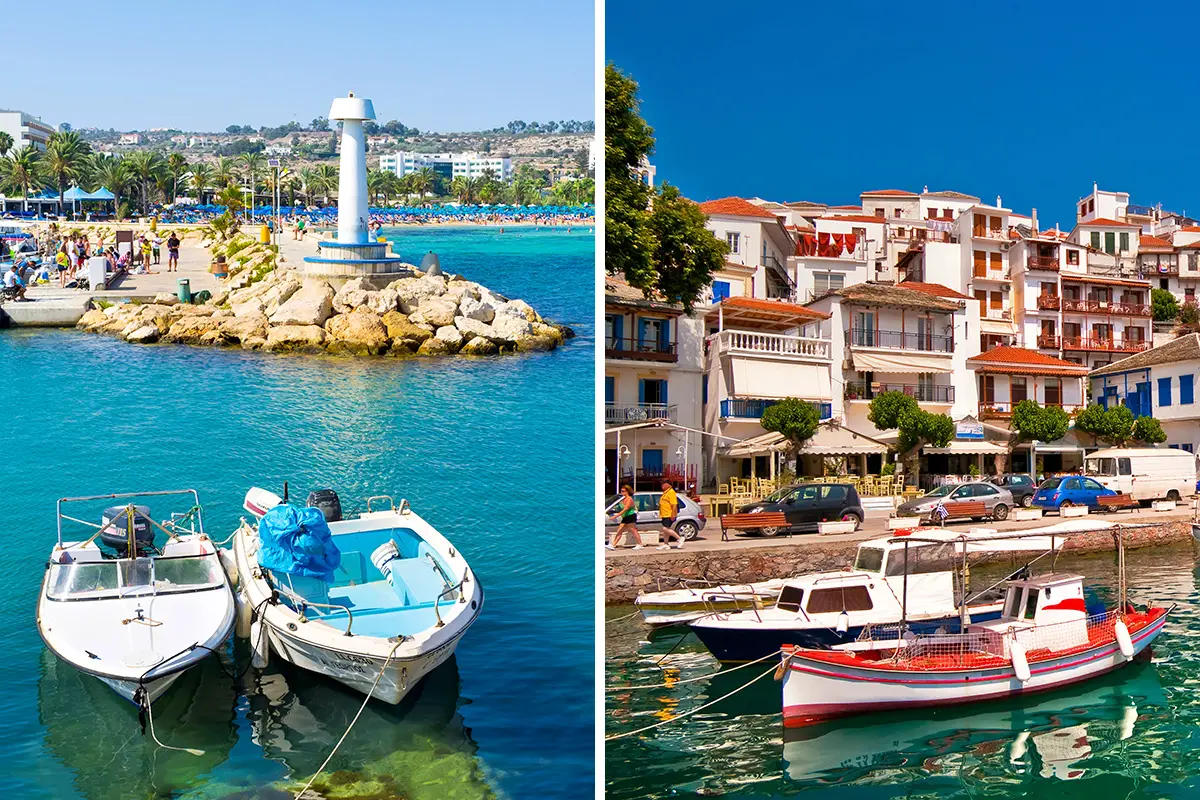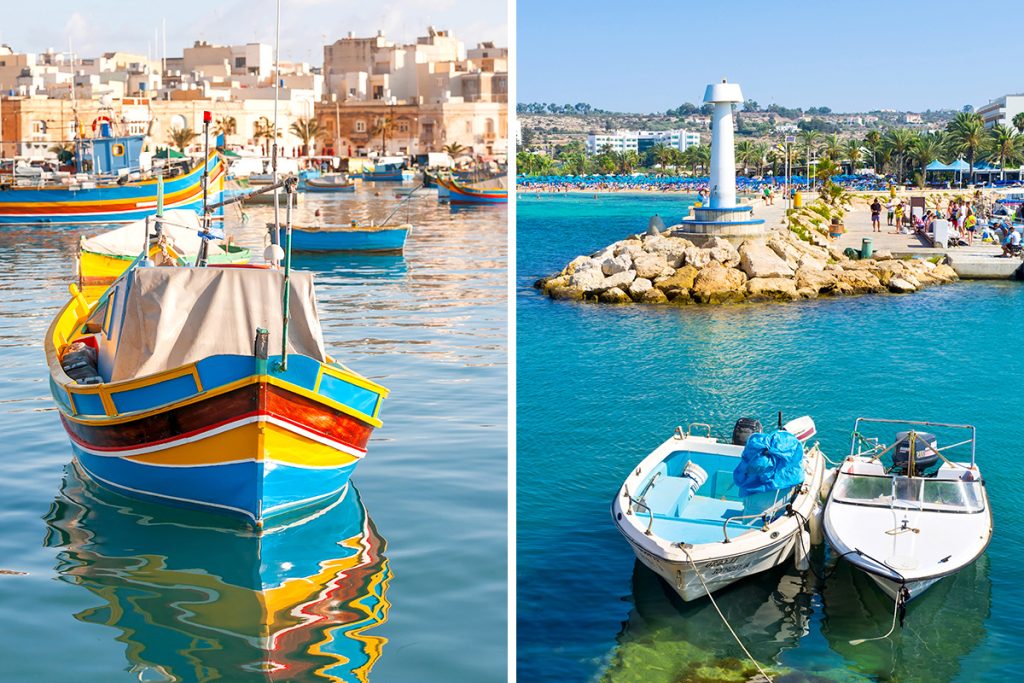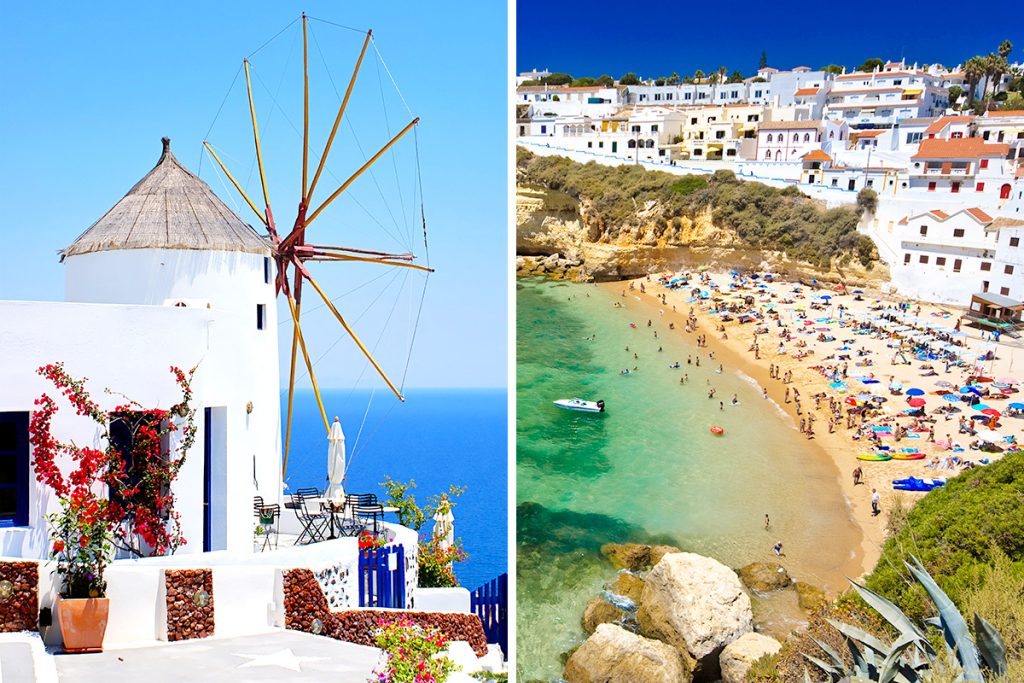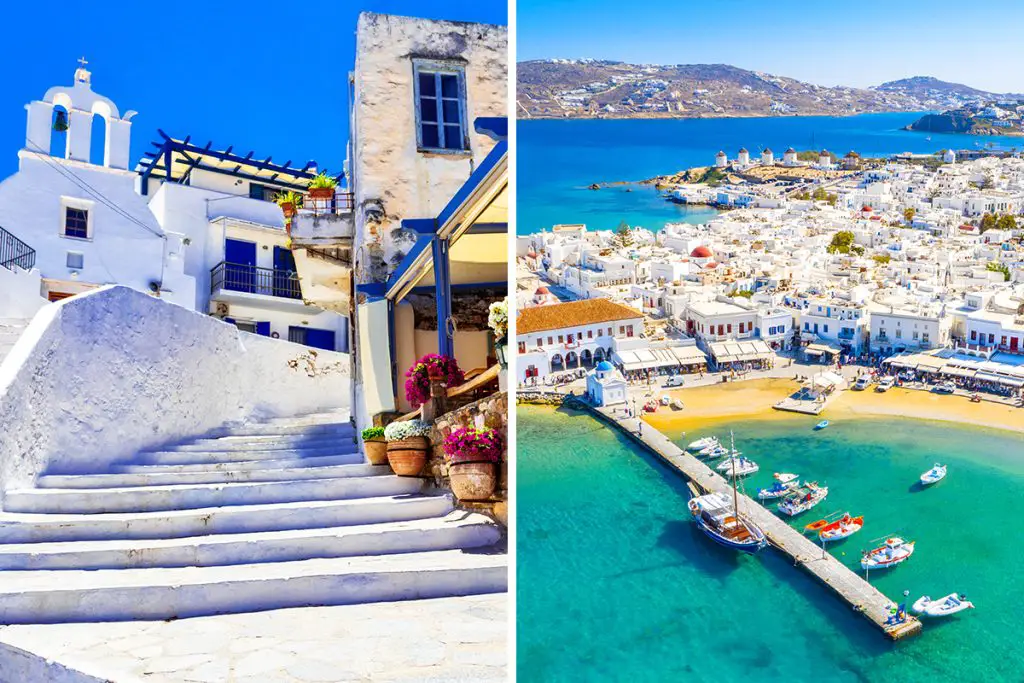In this piece, you’ll delve into these intriguing aspects and more. Your curiosity will be the compass guiding you through the fascinating historical paths and cultural landscapes of these two Mediterranean gems. So, buckle up and prepare to embark on this exciting journey!
History & Culture
When it comes to history and culture, Cyprus and Crete each hold their own distinct appeal. Cyprus, situated at the crossroads of Europe, Asia, and Africa, has a rich history shaped by diverse civilizations. Similarly, Crete, the largest of the Greek islands, boasts a history that goes back to the dawn of European civilization.
In Cyprus, you’ll find a unique blend of Greek and Turkish influences reflected in its culture. This fusion is a testament to the island’s complex history of conquests and settlements by various civilizations. From the Byzantines to the Ottomans, each has left an indelible mark on Cyprus’ cultural tapestry.
On the other hand, Crete, with its Minoan roots, offers a deep dive into one of the earliest European civilizations. The island’s culture is steeped in Greek mythology and ancient traditions. As the reputed birthplace of Zeus, Crete is a place where myth and history often intertwine, lending an air of mystique to its cultural identity.
Of course, both Cyprus and Crete have modern cultural aspects too. Contemporary arts and festivals thrive alongside traditional customs, offering a vibrant mix of old and new. Whether it’s the lively carnivals of Cyprus or the famous music festivals of Crete, there’s always something to keep the culturally curious engaged.
In summary, both Cyprus and Crete offer rich historical and cultural experiences. If you’re intrigued by the fusion of diverse cultural influences, Cyprus could be your ideal destination. However, if you’re more captivated by the allure of ancient civilizations and Greek mythology, Crete might be the island for you. Whichever you choose, you’re sure to embark on a fascinating journey into the past.
Attractions & Activities
When it comes to attractions and activities, Cyprus and Crete each provide a treasure trove of experiences. You’ll find a wide range of options to suit your unique interests, from exploring historical sites to immersing yourself in nature.
In Cyprus, you’ll have the opportunity to explore impressive archaeological sites, such as the Tombs of the Kings in Paphos, a UNESCO World Heritage site. If you’re a nature lover, you might enjoy a trek through the Troodos Mountains, where you’ll encounter picturesque villages, monasteries, and beautiful flora and fauna.
On the other hand, Crete offers its own unique blend of attractions and activities. You might find yourself strolling through the ancient ruins of the Palace of Knossos, marveling at the intricate frescoes and labyrinthine layout. If hiking is your thing, the Samaria Gorge, one of the longest canyons in Europe, offers a thrilling challenge with stunning views along the way.
While the attractions in Cyprus and Crete are diverse, they both offer opportunities for cultural immersion. In Cyprus, you can participate in traditional pottery-making workshops. Meanwhile, in Crete, you could learn traditional Greek dances or even try your hand at a cooking class to learn how to make Cretan dishes.
To sum up, whether you’re a history buff, an outdoor enthusiast, or a culture vulture, both Cyprus and Crete have plenty to offer. If you’re attracted to a blend of rich history and diverse natural beauty, Cyprus might be your ideal choice. If you’re drawn to ancient civilizations and love to immerse yourself in local culture, Crete could be just the place for you.
Beaches
As Mediterranean destinations, both Cyprus and Crete boast beautiful coastlines. If you’re a beach lover, you’re in for a treat, as each offers its own unique brand of beach experience.
In Cyprus, you’ll find a range of beaches, from secluded bays to lively resort areas. One standout is the famed Aphrodite’s Rock, where according to legend, the Greek goddess of love emerged from the sea. The beach here offers a unique combination of mythology and natural beauty. It’s located about 15 miles (24 kilometers) east of Paphos.
Meanwhile, Crete, being the largest Greek island, offers an even wider range of beach experiences. You might find yourself sunbathing on the pink sands of Elafonisi Beach, on the southwestern tip of the island, about 45 miles (72 kilometers) from Chania. This beach is famous for its unique pink-hued sand and crystal-clear waters.
Of course, both destinations offer more than just sunbathing. In Cyprus, you could try your hand at a range of water sports, while in Crete, you might enjoy exploring the marine life through snorkeling or diving.
In conclusion, both Cyprus and Crete offer stunning beach experiences. If you’re looking for a variety of beach landscapes and water activities, Cyprus may be your destination of choice. However, if unique natural features like pink sand appeal to you, then Crete could be your ideal beach destination.
Eating, Drinking & Nightlife
Diving into the culinary scene and nightlife is a vital part of experiencing Cyprus and Crete. Both destinations offer unique flavors, beverages, and nighttime festivities that leave lasting impressions.
In Cyprus, your taste buds will be delighted by traditional dishes like souvlaki, small pieces of grilled meat served with pita bread, and halloumi, a unique Cypriot cheese that can be grilled or fried. The local cuisine is a tasty blend of Greek and Middle Eastern influences, offering a rich, flavorful dining experience.
When it comes to beverages, Cyprus is known for its Commandaria, an ancient sweet dessert wine that has been produced on the island for centuries. You can enjoy it after a meal or use it as an excuse to sit back, relax, and soak in the Mediterranean atmosphere.
Nightlife in Cyprus can range from laid-back beach bars to energetic nightclubs, especially in the city of Ayia Napa. Here, you’ll find a vibrant party scene with a variety of music genres to dance to.
In contrast, Crete’s cuisine is at the heart of the Mediterranean diet, featuring fresh fruits, vegetables, and of course, lots of olive oil. You’ll enjoy dishes like moussaka, a layered eggplant and meat dish, and dakos, a hard bread topped with tomatoes, feta cheese, and herbs.
Drinking in Crete often involves raki, a strong distilled spirit often served at the end of a meal as a digestive. It’s a distinct part of the Cretan dining experience and is deeply rooted in the island’s traditions.
Cretan nightlife is a mix of traditional music nights in village tavernas and modern dance clubs in bigger cities like Heraklion and Chania. Whichever you prefer, you’ll feel the warm, welcoming atmosphere that Crete is famous for.
In conclusion, whether you’re a food lover, a wine enthusiast, or a night owl, both Cyprus and Crete cater to your desires. Cyprus offers a unique blend of culinary influences and vibrant nightlife, while Crete offers a deep dive into the Mediterranean diet with traditional drinks and a mix of traditional and modern nightlife.
Shopping
Shopping in Cyprus and Crete offers you a chance to bring home a piece of your travel experience. Both destinations offer a mix of traditional markets, modern shopping centers, and unique local boutiques.
In Cyprus, you’ll find a variety of shopping experiences. You might find yourself browsing through the narrow streets of old Nicosia, looking at local crafts, or in a modern shopping mall in Limassol, exploring international brands. One of the must-buy items in Cyprus is the traditional Lefkaritika lace, recognized by UNESCO for its cultural significance.
On the other hand, Crete offers its own unique shopping experience. The island is known for its leather goods, so you might find yourself trying on handmade sandals or browsing beautifully crafted leather bags in Chania or Heraklion. Crete is also famous for its olive oil, and a visit to a local producer or a specialty shop is a must.
In summary, both Cyprus and Crete offer unique shopping experiences, with a mix of traditional and modern options. If you’re interested in traditional crafts and modern shopping centers, Cyprus might be your go-to. However, if leather goods and local produce like olive oil are more your style, then Crete could be your shopping paradise.
Accommodation
Choosing where to rest your head at night is a crucial part of your travel plans. In both Cyprus and Crete, you’ll find a range of accommodation options that cater to different preferences and budgets.
In Cyprus, you’ll find everything from luxury resorts to cozy bed and breakfasts. Some of the high-end resorts are located in the coastal city of Paphos, providing stunning views of the Mediterranean Sea. For a more local experience, you might consider staying in a traditional guesthouse in the Troodos Mountains.
Crete, on the other hand, is known for its charming family-run guesthouses, locally known as “pensions”. These accommodations offer a warm and personal touch, often with homemade breakfasts. Of course, Crete also offers luxury resorts, particularly in the coastal areas like Elounda and Agios Nikolaos.
In conclusion, both Cyprus and Crete offer diverse accommodation options. Cyprus shines with its luxury resorts and traditional guesthouses, while Crete provides a unique local experience with its family-run pensions and luxury seaside resorts.
Family-Friendliness & Children’s Activities
When planning a family vacation, it’s important to consider how child-friendly your destination is. Fortunately, both Cyprus and Crete are excellent choices, offering a range of activities that will keep your kids engaged and entertained.
In Cyprus, there are numerous family-friendly beaches with calm waters, perfect for young swimmers. You can also enjoy water sports such as kayaking, snorkeling, or jet skiing.
Additionally, the island boasts several water parks and an aquarium, great for a fun-filled day out with the kids. Some of the most popular water parks are Fasouri Watermania in Limassol and WaterWorld in Ayia Napa. The aquarium in Protaras features over 400 species of marine life and a 12-meter (39 ft) long underwater tunnel.
Crete, meanwhile, offers a rich mix of outdoor activities that are perfect for families. These include hiking trails suitable for all ages, such as the Samaria Gorge or the Imbros Gorge. You can also explore the stunning natural beauty of the island by bike, horseback, or jeep safari.
Furthermore, Crete has fascinating archaeological sites where kids can learn about ancient civilizations. For example, you can visit the Palace of Knossos, the birthplace of the legendary Minotaur, or the Heraklion Archaeological Museum, which displays artifacts from the Minoan culture.
In summary, both Cyprus and Crete offer a variety of family-friendly activities. If your family loves the beach and water-based activities, Cyprus might be a good fit. But if outdoor adventures and historical sites excite you and your kids, then Crete could be the ideal destination.
Getting There & Getting Around
Reaching your destination and exploring it efficiently can greatly enhance your travel experience. Both Cyprus and Crete are well-connected and offer various modes of transportation.
To reach Cyprus, you’ll likely fly into one of the island’s two international airports, Larnaca and Paphos. Larnaca is the main gateway to the island, serving flights from Europe, Asia, and Africa. Paphos is smaller but closer to the western part of the island.
Once you’re there, getting around is relatively easy. The island has a comprehensive bus network, operated by different companies depending on the region. You can also find taxis in most towns and villages, or use a taxi app like Bolt or Kapnos. Renting a car is also an option if you want more flexibility. However, keep in mind that Cyprus drives on the left side of the road.
On the other hand, Crete has three airports, with Heraklion being the largest. It serves flights from mainland Greece and several European countries. The other two airports are Chania and Sitia, which mainly handle domestic flights.
The island’s bus system is efficient and covers most tourist sites. You can buy tickets online or at the bus stations. Like in Cyprus, you can rent a car for greater freedom, but be aware that some of the rural roads can be quite challenging. They are often narrow, winding, and steep. You might also encounter goats or sheep on the road.
In conclusion, both Cyprus and Crete are accessible and have good transportation networks. You might prefer Cyprus if you like the convenience of taxis, while Crete might be a better fit if you enjoy the adventure of navigating rural roads.
Here is a possible elaboration of the text:
Weather
When planning your next vacation, it’s essential to consider the weather. This section will compare the weather of two beautiful Mediterranean destinations – Cyprus and Crete.
Cyprus, an island in the Eastern Mediterranean, has a warm and sunny climate all year round.
In the summer months, which last from mid-April to mid-October, the average temperatures are between 82.4°F (28°C) and 98.6°F (37°C) in the coastal areas, and even hotter in the central areas. During this time, rain is extremely rare, and the island enjoys between 11 to 12 hours of sunshine per day.
Winter in Cyprus, which lasts from December to February, is considerably cooler. Average temperatures are around 60.8°F (16°C) in the coastal area and central area of Cyprus, and between 42.8°F (6°C) and 46.4°F (8°C) in the mountains. Winter months are the wetter months of the year, with around 8 to 10 rainy days per month on average for coastal and inland/central areas.
In contrast, Crete, the largest island in Greece, has a similar climate but with some differences.
The summer season in Crete starts in June and lasts till the end of September, with average temperatures around 81.5°F (27.5°C) to 85.1°F (29.5°C). The island receives between 9 to 12 hours of sunshine daily during this time, and the chances of experiencing rain are very slim.
Spring and autumn are still warm with average temperatures ranging from 62.6°F (17°C) to 74.7°F (23.7°C). The winter in Crete is mild but wet and blustery, with average daily temperatures ranging from 59.5°F (15.3°C) to 62.6°F (17°C). There are about 4 hours of sunshine that the island receives during winter, which translates into mainly cloudy, overcast weather.
In summary, both Cyprus and Crete enjoy a typical Mediterranean climate with hot, dry summers and mild, wet winters. However, Cyprus tends to be a little warmer in the summer, and its winter is slightly drier compared to Crete. Sunshine is abundant in both destinations throughout the year, but Cyprus has slightly more sunshine hours during the winter months.
Safety
Cyprus and Crete, being popular Mediterranean tourist destinations, are generally considered safe for visitors. However, as with any location, there are unique safety considerations for each.
In Cyprus, crime rates are relatively low, and violent crimes are rare. The most common safety issues relate to road safety due to driving habits and conditions. Road accidents are a concern, so it’s advisable to be cautious when driving or crossing roads.
You should also be aware of the political situation in Cyprus, which is divided into two parts: the Republic of Cyprus and the Turkish Republic of Northern Cyprus. While the border between the two is open, you might need to show your passport and follow certain regulations when crossing.
Crete, like Cyprus, is also generally safe, with a low crime rate. However, petty crime such as pickpocketing can occur in busy tourist areas, so it’s advisable to be mindful of your belongings. You should also be careful when swimming or snorkeling in the sea, as there might be strong currents or dangerous marine life.
Crete is also prone to seismic activity, and wildfires during the hot, dry summers can pose risks. You should follow the local authorities’ advice in case of an emergency.
In summary, Cyprus and Crete are both safe destinations for travelers, but they have some unique safety challenges that you should be aware of. You should always exercise common sense and respect the local laws and customs when visiting either destination. By doing so, you can enjoy your trip without any worries.
Cost
Another factor that you might consider when choosing between Cyprus and Crete is the cost. How much money will you need to spend on your trip? What are the prices of accommodation, food, transportation, and attractions at each destination?
Cyprus is generally more expensive than Crete, especially in the peak season of summer.
The average cost of a hotel room in Cyprus is about 100 euros ($115) per night, while in Crete it is about 70 euros ($80) per night. The cost of food and drinks is also higher in Cyprus, with an average meal costing about 15 euros ($17) per person, while in Crete it is about 10 euros ($11) per person.
Transportation costs are similar in both destinations, with buses and taxis being the main options. However, renting a car might be cheaper in Crete, where you can find deals for as low as 20 euros ($23) per day.
Attractions vary in price depending on the type and location, but generally, you can expect to pay more in Cyprus than in Crete. For example, a ticket to the aquarium in Protaras costs 19 euros ($22) for adults and 13 euros ($15) for children, while a ticket to the Heraklion Archaeological Museum costs 10 euros ($11.50) for adults and 5 euros ($5.75) for children.
However, there are ways to save money and enjoy both destinations on a budget. You can look for cheaper accommodation options such as hostels, guesthouses, or Airbnb rentals. You can also cook your own meals or eat at local tavernas instead of fancy restaurants.
You can also take advantage of free or discounted attractions such as beaches, parks, or historical sites. You can also travel during the off-season or shoulder season when prices are lower and crowds are smaller.
In summary, Cyprus and Crete have different costs of living and traveling. Cyprus is generally more expensive than Crete, but both destinations offer value for money and opportunities to save. You should consider your budget and preferences when deciding which destination suits you better.
Which Is Better – Cyprus or Crete?
Reflecting on the diverse aspects of Cyprus and Crete, it is clear that each destination has its own distinctive charm and allure. From their rich history and culture to the variety of attractions, activities, and family-friendly options, both islands have plenty to offer.
When examining the history and culture of both destinations, you find a rich tapestry woven with time.
If you have a passion for archaeological sites and ancient civilizations, Cyprus, with its range of UNESCO World Heritage Sites, may hold a greater appeal. On the other hand, Crete, the cradle of the Minoan civilization and the birthplace of Zeus according to mythology, offers its own cultural treasures.
In terms of attractions and activities, both islands offer a range of options to suit every type of traveler.
If you lean towards adventurous outdoor activities, the rugged landscapes of Crete provide an excellent backdrop for hiking and exploring. Conversely, if you prefer a mix of leisure and adventure, Cyprus, with its combination of serene beaches and adrenaline-pumping water sports, might be your ideal destination.
When it comes to beaches, both Cyprus and Crete are blessed with stunning coastlines. If you are a beach lover who prefers more secluded spots, Crete’s diverse coastline offers numerous hidden coves and quieter beaches. Alternatively, if you are after blue flag-rated beaches with full facilities, Cyprus might be more to your liking.
Taking into account the culinary experiences, both islands have a rich tradition of Mediterranean cuisine.
If you’re a foodie who enjoys wine, the vineyards and wineries of Cyprus might make it your preferred choice. However, if you’re captivated by traditional cuisine and locally sourced ingredients, Crete’s famous Mediterranean diet, considered one of the healthiest in the world, will not disappoint.
When considering safety and cost, both islands show similar profiles. They both offer a safe environment for tourists with relatively low crime rates, although you should always be mindful of your personal belongings and surroundings. As for costs, both islands are moderately priced destinations, making them accessible for various budget ranges.
In conclusion, whether Cyprus or Crete is the better choice for you depends on your personal preferences and what you value most in a holiday destination. Each island has its unique offerings and appeal. Whether you choose the ancient allure of Cyprus or the natural beauty of Crete, you’re sure to enjoy a memorable and enriching experience.







